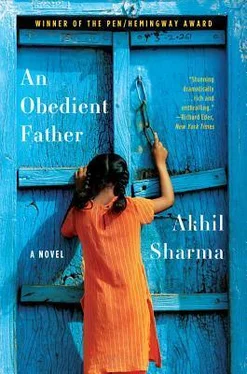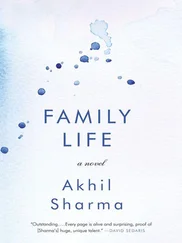the ceremony. "Will you give us a ride around the block?" Mr. Mishra called to one of the boys.
The boy looked at us seriously and said, "No." The other one scurried up the fence and hopped onto a eucalyptus tree in the park. He stood on one branch and, grabbing the branch above him, began jumping to break the branch beneath him. The whole tree nodded.
Mr. Mishra hesitantly asked me, "Is it true that Mr. Gupta had to give the BJP twelve lakhs for their support?"
The amount was frightening, because if things changed there wouldn't be anything to use in negotiating with Congress. "I know less than you do," I said. The branch being jumped on broke and fell beside the elephants. They began eating its leaves.
I went into the house to let Mr. Gupta know I had arrived. Servants in blue uniforms were moving about the veranda. A red-and-blue dhurrie, like the ones used at weddings, had been spread across the floor. Thick cables ran beneath the rug and several servants were busy attaching them to fans lined up along the veranda walls. From somewhere inside the house I heard a generator's heavy hum.
Mr. Gupta's son, Ajay, was standing against a wall arguing with a balding man in his forties who wore the white kurta pajama that is the BJP's uniform. Ajay had a thyroid problem that made him alternately fat or very thin. Just then he was fat. Ajay also had on the BJP costume. I was about to pass them when Ajay shouted, "Uncleji," at me. This was surprising, because he usually called me Mr. Karan. I wondered whether it was marriage or his father entering politics that had caused the shift to respectful familiarity. "Daddy is going to sit on the ground for the puja, so I think we shouldn't use chairs," Ajay said, "but he says we have to."
"I don't care whether you have chairs or not," the BJP man replied, only glancing at me. I wondered if he knew we were switching parties. "I was told there had to be chairs." Something about Ajay made people impatient. After a few minutes with him, you sensed something both manipulative and stupid. Ajay changed rings and diets to match his astrological sign. He spoke domineeringly about
unimportant things. Up to then, I had thought of Ajay as a shocking disappointment compared to his father. But now that I knew how successful the rest of Mr. Gupta's family was, it seemed reasonable that Mr. Gupta's family was slowly reverting to the average.
"Put the chairs inside," I said to the man. "If we need them, I'll have them brought out."
"Who are you?"
"My name is Ram Karan. I'm Guptaji's man." Maybe the BJP man had heard of me, because he immediately became silent. I felt a rush of pride at this. "Ask me if there are any more questions," I said.
As the BJP man left, Ajay said loudly, "He doesn't listen."
I clapped him on the back and asked how his marriage was. I started thinking that Mr. Gupta would certainly not trust Ajay with much responsibility if he became an M.P., and that power would drift toward me. I imagined arranging water and electricity for whole neighborhoods, exchanging ration cards for votes.
"What's in the bag?"
"Something of your father's." Ajay did not ask what it was, discretion that surprised me.
He took me into the kitchen, where his wife, Pavan, was making sure that the six or seven people cooking did no harm to the room. The kitchen was as large as my living room, and along one wall was a row of brick-colored gas tanks.
"Namaste," Pavan said. She was beautiful. She had wavy hair which reached her waist, a wonderful oval face and rounded, even teeth, and she wore a sleeveless blouse, which meant that she must be daring enough to shave her underarms. Pavan was a Sikh. Seeing her beauty, I was baffled that she had been willing to leave her religion and risk losing her family for Ajay.
"You are doing a lot of work," I said.
"Not so much," Ajay answered for her, and took me farther into the house and up a staircase to meet Mr. Gupta.
Mr. Gupta was sitting on the floor at the center of a wide and brightly lit room. All the furniture had been pushed against its pale
green walls. He was wearing only pajamas. He had wide shoulders and distinct muscles on his arms. Around him were five men near my age in white kurta pajamas. One of these was scrubbing Mr. Gupta's face with a mixture of flour, sandalwood paste, and grass while the rest watched. Mr. Gupta's face and chest were streaked with yellow. He was smiling broadly "I'm marrying again," he said to me when I came in. Then I realized that he was being prepared in the same way a groom is by his sisters before the wedding.
One of the men watching shook my hand and said, "Thank you for coming, Mr. Karan. I am Pankaj Tuli." He was tall and slender, with completely white hair and a young face. I was surprised to be treated with such respect. I wondered whether Mr. Gupta needed to present himself as a leader and so Mr. Mishra and I were to play the role of followers.
A very short man with a slightly hunched back went to a dining-room table that was pressed against one wall and brought back a white plastic bag. From the size of the bag and because of how it felt, I could tell it held cloth. "Naveen Kumar," he said, introducing himself, and, shaking my hand, gave me the bag.
"For you," Mr. Gupta said, as his head bobbed back and forth from the rubbing. I slid the cloth out. It was a shawl made from a reddish brown wool. It was so soft and smooth it felt slippery.
"Pashmina," said Mr. Tuli.
I had never touched pashmina before. To me pashmina shawls had always been something in stories: what the Birlas gave Mahatma Gandhi; what would make you sweat in winter if you wrapped yourself tightly in it. I felt a wonderful wrench of dislocation, of being in my own world and also belonging to a world where gifts of pashmina shawls were given.
Ajay rubbed the cloth between his fingers. "I got a watch and cloth for a suit," he said. I thanked Mr. Tuli and carefully slid the shawl back in the bag.
"Do you have my dowry, Mr. Karan?" Mr. Gupta asked.
I said yes, and he tapped the floor beside him. I put the bankbooks there and went around the room introducing myself to each of
the BJP men. I had heard of one of them before, a bald man whose kurta collar bore delicate white embroidery. The others I did not know. I wondered how loyal they would be to Mr. Gupta, knowing he had already betrayed one set of political allegiances.
"Come downstairs," Ajay said, taking my elbow, "and tell me if you think everything is right." I smiled wryly at the BJP men, as if this humoring of a child must be something they were also familiar with.
As soon as we were on the stairs, Ajay said, "They're friendly now, but tomorrow they might not know his name." I sensed that Ajay wanted me to reveal myself, but I merely nodded and let him try to press me. I kept the shawl in one hand. Holding it made me happy. "My father can't show that he knows this, but he does."
"Politics," I said. I felt capable of serving Mr. Gupta.
"You have to be polite." We reached the bottom of the stairs, and Ajay, looking me in the eye, said, "If he wins, we'll have to do the hard things for him, the bad things." I shrugged my shoulders, as if I were a man and knew what men had to do. The more Ajay spoke, the more confident I became that if Mr. Gupta rose in the world, so would I.
On the veranda the servants were stringing garlands of geraniums along the walls in cursive u^s. There was no work for us, so we stood in a corner. Ajay nattered on about the BJP. At some point he checked himself, grinned, and asked, "Shall we have a peg?" I had not thought about alcohol for days, but as soon as he said it, I felt desire overcome me. It was as if I had passed a room with the door slightly open and glimpsed a woman lying naked on a bed. "Thinking of these people gets me angry," Ajay said. "A peg of whiskey." There was something so obviously false about him that I knew he had a plan.
Читать дальше












